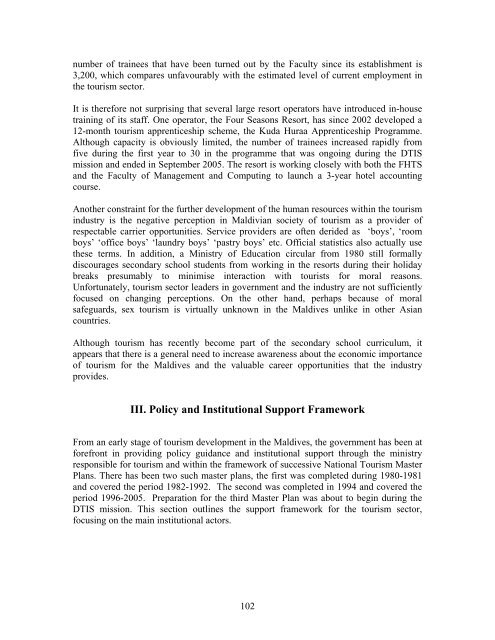DTIS, Volume I - Enhanced Integrated Framework (EIF)
DTIS, Volume I - Enhanced Integrated Framework (EIF)
DTIS, Volume I - Enhanced Integrated Framework (EIF)
Create successful ePaper yourself
Turn your PDF publications into a flip-book with our unique Google optimized e-Paper software.
number of trainees that have been turned out by the Faculty since its establishment is<br />
3,200, which compares unfavourably with the estimated level of current employment in<br />
the tourism sector.<br />
It is therefore not surprising that several large resort operators have introduced in-house<br />
training of its staff. One operator, the Four Seasons Resort, has since 2002 developed a<br />
12-month tourism apprenticeship scheme, the Kuda Huraa Apprenticeship Programme.<br />
Although capacity is obviously limited, the number of trainees increased rapidly from<br />
five during the first year to 30 in the programme that was ongoing during the <strong>DTIS</strong><br />
mission and ended in September 2005. The resort is working closely with both the FHTS<br />
and the Faculty of Management and Computing to launch a 3-year hotel accounting<br />
course.<br />
Another constraint for the further development of the human resources within the tourism<br />
industry is the negative perception in Maldivian society of tourism as a provider of<br />
respectable carrier opportunities. Service providers are often derided as ‘boys’, ‘room<br />
boys’ ‘office boys’ ‘laundry boys’ ‘pastry boys’ etc. Official statistics also actually use<br />
these terms. In addition, a Ministry of Education circular from 1980 still formally<br />
discourages secondary school students from working in the resorts during their holiday<br />
breaks presumably to minimise interaction with tourists for moral reasons.<br />
Unfortunately, tourism sector leaders in government and the industry are not sufficiently<br />
focused on changing perceptions. On the other hand, perhaps because of moral<br />
safeguards, sex tourism is virtually unknown in the Maldives unlike in other Asian<br />
countries.<br />
Although tourism has recently become part of the secondary school curriculum, it<br />
appears that there is a general need to increase awareness about the economic importance<br />
of tourism for the Maldives and the valuable career opportunities that the industry<br />
provides.<br />
III. Policy and Institutional Support <strong>Framework</strong><br />
From an early stage of tourism development in the Maldives, the government has been at<br />
forefront in providing policy guidance and institutional support through the ministry<br />
responsible for tourism and within the framework of successive National Tourism Master<br />
Plans. There has been two such master plans, the first was completed during 1980-1981<br />
and covered the period 1982-1992. The second was completed in 1994 and covered the<br />
period 1996-2005. Preparation for the third Master Plan was about to begin during the<br />
<strong>DTIS</strong> mission. This section outlines the support framework for the tourism sector,<br />
focusing on the main institutional actors.<br />
102
















